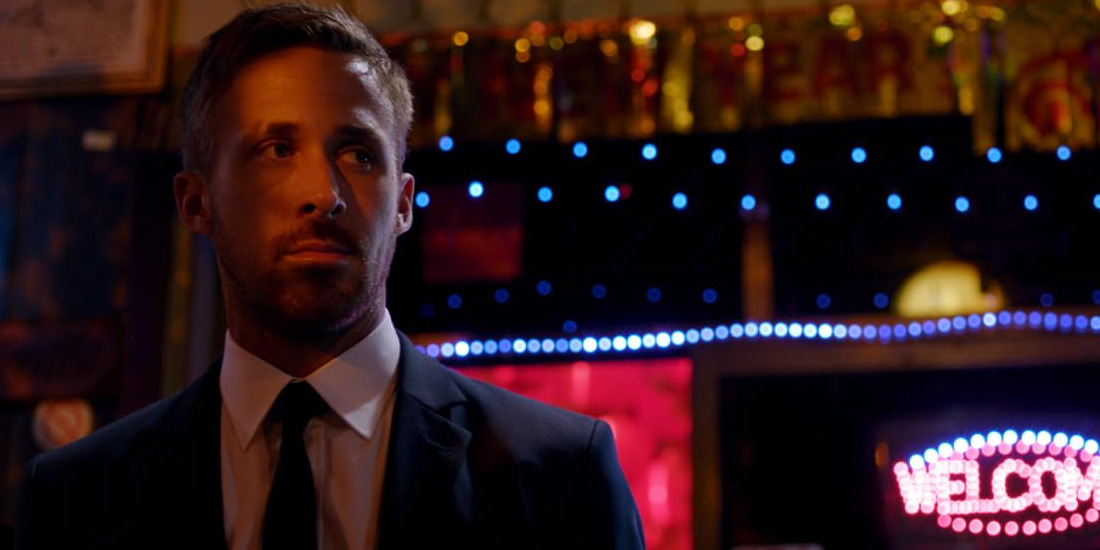The 2013 crime drama film ‘Only God Forgives,’ directed by Nicolas Winding Refn, is an exploration of violence and vengeance. Julian and Billy, American drug smuggling brothers, run their operation in Bangkok with a boxing club as their front. However, after Billy’s depraved actions lead to his eventual murder, the former finds himself at a moral crossroads. While his mother, Crystal, forces him to avenge his brother’s death by exacting revenge upon the vigilante katana-bearing cop, Chang, Julian deals with his own complicated life.
Ripe with metaphors and symbolism, ‘Only God Forgives’ is a film that heavily deals in artistically resonant visuals. Although the film’s base premise, a revenge plot as a tool for a transformative journey, presents a familiar storyline, its inner building blocks elevate it to a different level. Given the film’s focus on surrealism and innovative imagery, people might be wondering if it is inspired by true events.
Only God Forgives is an Original Screenplay
‘Only God Forgives’ is not based on a true story. This film is entirely the brainchild of writer/director Nicolas Winding Refn, best known for his 2011 film ‘Drive.’ His cinematography is infamously recognized for its aesthetic elements paired with the filmmaker’s fascination with violence that evokes a reaction from the audience. With ‘Only God Forgives,’ Refn certainly achieves the same. While discussing this film’s inception, he described the film as “pure fetish.”

Expanding on the same, the filmmaker cited a similar film from his youth that informed his approach to this project. “There’s a film called ‘The Evil Cameraman’ by Richard Kern,” said Refn in an interview with Slant Magazine. “It’s a short film from the early 90s that made quite an impression on me when I was a teenager, and it consists of a man coming in and tying up a woman while we hear rock music. The woman submits herself to being tied up in some kind of sexual fetish. It was extremely frightening when I saw it, but there’s also something very erotic about it.”
This combination of frightening eroticism and the situation’s inherent violence reflects adequately in ‘Only God Forgives.’ The film places a man tormented by his past in a position where he is equally unable to escape it. Ryan Gosling’s mysterious and brooding character, Julian, delivers scant few lines but remains as the narrative’s thematic epicenter. Julian’s central conflict, cryptically depicted through hand imagery, primarily revolves around his violent past and a subsequently isolated future. Interestingly, the same falls perfectly in line with the film’s origin.
Speaking about the same, Refn said, “The first image I had for ‘Only God Forgives’ was a clenched fist because it’s such an iconic image of male brutality and masculine entertainment. But it’s also an extension of a phallus, and the more you clench your fist, the more of a phallus it symbolizes. So, the act of sex and violence, in one gesture, is very interesting.” As such, the crux of Julian’s character, torn between sexual desire and violence, unable to have either, effortlessly complements the film’s themes of sex and violence.
Similarly, the film’s employment of red lightning, which significantly informs its visual aesthetic, has a thematic intention behind it. When discussing the same, the filmmaker said, “Red is, on one level, a very frightening image because it’s what we would look at if we were to open up ourselves. And yet, it’s also very erotic. What else can I say?” Hence, it’s safe to say that from its initial inception to the final product, ‘Only God Forgives’ is an art piece revolving around specific themes intrinsic to the human condition. The same helps the story to stir loud emotions in the audience because they can connect to it in varying capacities. Nevertheless, it has no interest in reflecting reality.
Early on in his career as a filmmaker, Refn realized it’s impossible to capture authenticity and that, often, it only comes across as manufactured. Therefore, the concept of unreality overtook his interest, and art became an act of violence meant to inflict emotion. “Art is a nonlinear format, but we live a linear life because of time. And we’ve become accustomed to thinking that our art should be linear like our life is, which is terrible because art should combat that,” said Refn. The same is achieved through ‘Only God Forgives.’ which crafts a captivating tale that incites emotion, good or bad, without having a basis in reality.
Read More: Only God Forgives Ending, Explained: Does Julian Kill Chang?


You must be logged in to post a comment.